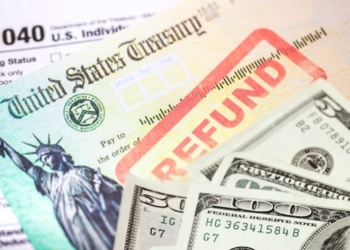If you’re among the millions of Americans who typically file taxes early, eagerly anticipating that refund, you might want to brace yourself. This year, the things are changing, and they are changing a lot and could cause your tax refund maybe delayed.
The Internal Revenue Service (IRS) is rolling out significant changes to its review process, and for many, this will mean one thing: a much longer wait for a refund. While the goal is to combat fraud, the unintended consequence is that some of the most vulnerable taxpayers—including retirees and lower-income families—could see their refunds delayed by weeks, or even months.
Don’t delay your tax refund: What’s behind this slowdown?
In short, the IRS is putting a magnifying glass on returns that claim certain key credits, like the Earned Income Tax Credit, the Child Tax Credit, and the American Opportunity Tax Credit.
The agency is expanding its identity verification and fraud detection systems, meaning a larger number of returns will be pulled for a manual, line-by-line review. It’s important to understand that this can happen even if your paperwork is perfectly in order. The system is designed to cast a wider net, and that means some perfectly legitimate claims will get caught in it.
Your tax refund action Plan: steps to sidestep the slowdown
For many, a tax refund is more than just a nice bonus and it’s more than a necessary part of their yearly financial planning. Imagine a retiree on a fixed income. That refund is often earmarked for pressing obligations like property taxes, a hefty insurance premium, or medical bills that have piled up over the year.
A delay of a few weeks isn’t just an inconvenience; it can force difficult choices between paying for medicine and paying the electric bill. The financial stability of entire households hangs in the balance.
The method of filing your taxes also plays a huge role
While e-filing is the fastest route, many older taxpayers understandably prefer the familiarity of a paper return. Unfortunately, this choice comes with a heavy cost in time. Paper returns enter a queue for manual data entry, a process that is not only slower but also more prone to human error.
The IRS has long struggled with staffing and paper backlogs, and with these new, more intensive reviews, those mailed-in envelopes are likely to sit untouched for much longer.
Simplifying Your filing: A guide to fewer delays
A major driver of these delays is the IRS’s growing reliance on data from third parties. The agency now meticulously compares the numbers you report with those submitted by your employer, your bank, and the Social Security Administration.
If there’s even a tiny mismatch—perhaps a 1099 form hasn’t been processed yet, or a pension provider reported a slightly different amount—your return can be flagged and put on hold until everything aligns.
For retirees with multiple income streams from investments, pensions, and annuities, the chances of a minor discrepancy are that much higher. A single typo in a Social Security number can be enough to trigger a lengthy verification process.
While these systemic changes are beyond any individual’s control, there are clear, practical steps you can take to stack the odds in your favor.
File your taxes electronically (and early)
This is the single most effective action you can take. E-filing allows your return to enter the IRS’s automated processing stream from day one, bypassing the massive paper backlog. Filing early simply gives you a head start, ensuring your return is processed before the mid-April rush.
Embrace direct deposit, for faster delivery: If you want your money fast, have it sent directly to your bank account. This eliminates the week or more it can take for a paper check to travel through the mail and then be deposited and cleared.
Double-check everything: Before you hit “submit,” review every figure and every digit of every Social Security number. A moment of careful proofreading can prevent a simple typo from derailing your refund for months. Ensure the names on your return exactly match those on your Social Security cards.
Get your ducks in a row now: prepare your taxes with time
If you’re claiming credits that require extra documentation—like receipts for tuition, documents for dependents, or records of childcare expenses—gather them now. Don’t wait until the last minute. Being prepared means you can file accurately and early.
For those with more complex situations, like selling a property or taking distributions from retirement accounts, it may be wise to consult a professional. A reputable tax preparer stays current on these evolving regulations and can help you identify potential red flags before they become problems.
In a tax season defined by new delays, your best strategy is old-fashioned preparation. A little extra care and a proactive approach can make all the difference in navigating this new, slower reality and bringing your refund home without an unnecessary wait.







